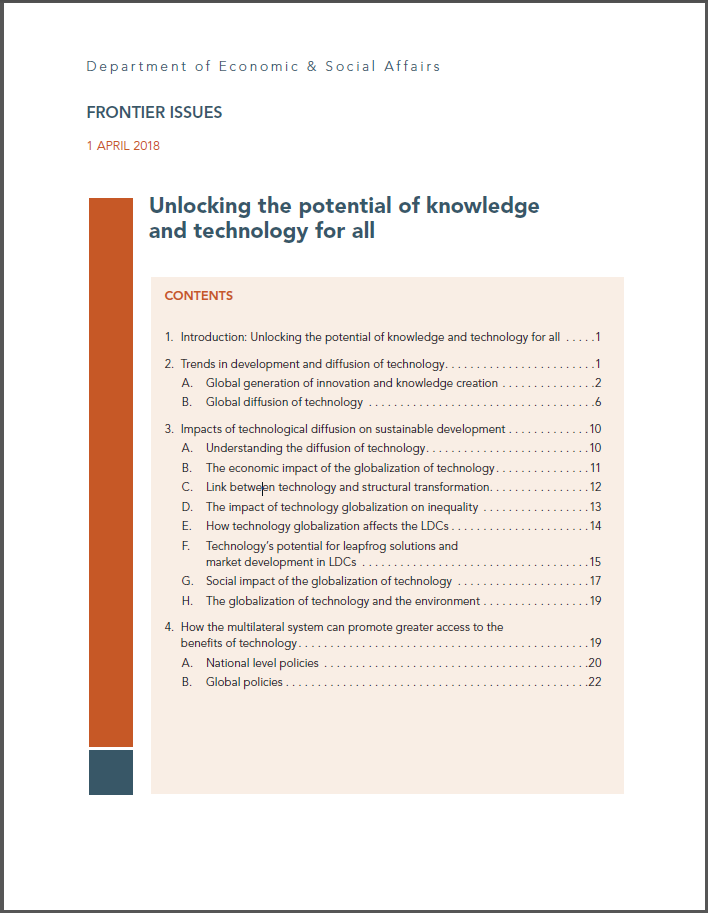
Frontier Issues: Unlocking the potential of knowledge and technology for all
Globalization of technology
Knowledge and technology have spread around the world as societies and economies become increasingly interconnected. As globalization of technology, of trade, of finance and of people are interrelated and mutually reinforcing, it is easy to imagine examples whereby technology enabled greater trade and finance, where trade led to the diffusion of technologies and demand for finance, where finance has enabled trade and technological progress, and where movement of people led to knowledge spillovers.
The rapid diffusion of technology around the world has brought extraordinary benefits to many people who would otherwise have limited access to innovations in communication, production, health, education, and many others. Access to knowledge and technology have contributed to solutions for environmental, social, and economic problems. From opening new options for renewable energy, to revolutionizing the delivery of government services, improving health care, and creating new jobs, technology impacts almost everyone’s lives.
But the access to technology and innovation has been uneven. While some have access to advanced technologies, including the latest developments in science, engineering, healthcare, and others, many are still lacking access to technologies that were invented decades ago. There is a growing gap between developed and developing countries in how much recent technologies are used. This has accentuated the division between countries, in particular it has increased the difference between those in the frontier of technological advancements (core) and those lagging behind (periphery).
To achieve the potential of technology while leaving no one behind, it is important to achieve greater diffusion and adoption of technology in areas where it can have great impact. The number of people lacking access to even basic technologies like electricity and basic water and sanitation systems, for example, illustrates the challenge of diffusion. Advanced technologies can unlock large productivity gains for those that can use them, and widen the gap with those that cannot. The multilateral system has an important role to play in promoting and facilitating technological diffusion.
At the same time, some technologies involve trade-offs or have unintended consequences. Automation enabled by technology creates winners and losers. There is a concern, for example, that technology will lead to a mass replacement of workers. Understanding these issues require institutional approaches to ensure that the path towards the 2030 objectives is not undermined by the negative effects of technological progress. The multilateral system has a central role in supporting national efforts.
CONTENTS
- Introduction: Unlocking the potential of knowledge and technology for all
- Trends in development and diffusion of technology
- Global generation of innovation and knowledge creation
- Global diffusion of technology
- Impacts of technological diffusion on sustainable development
- Understanding the diffusion of technology
- The economic impact of the globalization of technology
- Link between technology and structural transformation
- The impact of technology globalization on inequality
- How technology globalization affects the LDCs
- Technology’s potential for leapfrog solutions and market development in LDCs
- Social impact of the globalization of technology
- The globalization of technology and the environment
- How the multilateral system can promote greater access to the benefits of technology
- National level policies
- Global policies
This study was prepared by Marcelo LaFleur and Kenneth Iversen of DESA/DPAD of the Department of Economic and Social Affairs and Lars Jensen of UNDP. You may contact them for any inquiries or feedback via our contact form. The authors are thankful for substantive comments from: Pingfan Hong, Nazrul Islam, Hiroshi Kawamura, Mariangela Parra-Lancourt, Sergio Viera, Alex Julca, Hoi Wai Jackie Cheng, and Nicole Hunt (DESA/DPAD); Pedro Conceição, Thierry Soret, Nergis Gulasan, Simon Zadek, Elham Seyedsayamdost (UNDP); Neil Pierre, Joop Theunissen, Philipp Erfurth, Filipa Correia (DESA/OESC); Sharon Spiegel, Oliver Schwank (DESA/FFD).

Follow Us